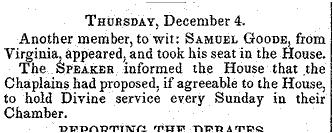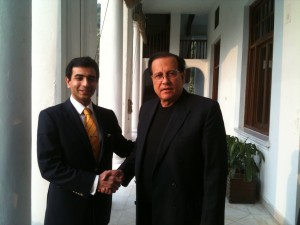UPDATE: For more information about Getting Jefferson Right: Fact Checking Claims about Our Third President, go to GettingJeffersonRight.com.
David Barton claims that Thomas Jefferson approved the use of the Capitol building as a church in 1800. On his April 11 podcast, Barton claimed that Jefferson was so religious that he would look like a “Bible thumping evangelical” with the following example given as evidence:
And I’ll give you a great example. We moved into the US Capitol in 1800, November of 1800. And when we moved in, one of the first acts of Congress was to approve the use of the Capitol as a church building. You can find that in the records of Congress, Dec 4 1800. Now, who did that? You had the head of the Senate and the head of the House, the speaker of the House was John Trumbull, the president of the Senate who approved that was Thomas Jefferson. Thomas Jefferson approves church in the Capitol? Yep, he went there as Vice President, he went to the church at the Capitol for 8 years as President, and as President of the US, he’s going to church, and this is recorded in all sorts of members of Congress, their records, their diaries, because they went to church at the Capitol too. And so, Thomas Jefferson, President of the United States, thinks, you know I think I can help the worship services at this new church at the Capitol, they met in the Hall of the House of Representatives, so Jefferson ordered the Marine Corp band to come play for the worship services, in the church services at the US Capitol. The worship band is the Marine Corp Band? Pretty good worship band. Thomas Jefferson did that. I thought he wanted separation of church and state. If you read his letter on separation of church and state, he said separation of church and state, he makes it very clear, separation of church and state will keep the government from stopping a public religious activity.
In fact, the records of Congress do note the request for use of the House of Representatives for church services. Here is the entry marking the occasion:

Note that the Speaker informed the assembled representatives that the Chaplains proposed to hold services in the Chamber. Apparently, it was agreeable to the House of Representatives since there is no recorded objection or vote on the matter. The Senate chaplain was Dr. Thomas John Claggett, an Episcopalian, and the House chaplain was Rev. Thomas Lyell, a Methodist. Both had begun their appointments in November, 1800.
Barton said that John Trumbull was the Speaker of the House but it was Theodore Sedgwick who raised the matter to the House on December 4, 1800. Jefferson was indeed President pro tempore of the Senate. However, according to the records of the Senate that same day (general business and the executive committee), nothing was mentioned about use of the Capitol building as a church.
In fact, the Senate did not need to approve the matter since the request came to the House for their Chamber. I can find no vote, affirmation or acknowledgement by the Senate. Unless Barton can demonstrate otherwise, it is incorrect to say that Thomas Jefferson approved, in some official manner, church services in the Capitol.
Jefferson did indeed attend church in the chamber which is not too surprising given the lack of churches in the District of Columbia at the time, as well as the general lack of social life. About church in DC at the time, Wilhelmus Bogart Bryan wrote in his book, A History of the National Capitol:
It will be noted that the period of 1801-1813 in the case of the churches was one of development and expansion. For at the beginning there were three church organizations, only one of which owned the building which it occupied, while twelve years later there were seven churches and a chapel, all of which owned the buildings which were used for the services. While in most instances the congregations were small in numbers and limited in resources, yet on the whole the church expansion reflected the growth of the community as well as its material condition…
Then Bryan discusses the Capitol church and the social aspects of the events. Bryan describes the Capitol as “a forum” where many religious views were discussed. The event was apparently quite a social happening:
At the same time the speaker’s desk in the hall of the house of representatives Sunday after Sunday was a forum from which was presented a wide range of religious belief. The chaplains of congress officiated there, as did also ministers representing various denominations. Frequently the religious atmosphere was lacking, sometimes due to the audience turning the occasion into a social function and then again to the eccentric character and views of the preachers. Rev. Manasseh Cutler was not pleased with the discourse of Rev. John Leland, who arrived in the city January, 1802, with the mammoth cheese which was presented to President Jefferson. On the following day he officiated at the capitol. The president was in the congregation, as it was his custom to be in the early years of his administration.
Incidentally, John Leland was one of the fiercest proponents of religious freedom and personally lobbied James Madison for a religious liberty clause in the Bill of Rights. The whole thing sounds religious in the general sense but not doctrinaire.
Barton also claims that Jefferson ordered the Marine Band to play in order to aid the worship. I can find no proof of that. If Mr. Barton has documentation of that claim, he should offer it. According to the record of the House and Bryan’s observations, the Chaplains were in charge. I suspect they invited the band to play. Bryan comments about the Marine Band:
It was apparently a new feature of the capitol services when in February, 1805, the Marine Band was stationed in the gallery and “after the preaching . . . the marines . . . played Denmark. Were there next Sunday. Two pieces of psalmody by the band of the marine corps. They attended in their uniforms about eighty or one hundred.”
One of sources of information about Jefferson, the Capitol church forum and the Marine band is a book by Margaret Bayard Smith, wife of a newspaper publisher. The book is a free ebook via Google and can be read there. I am producing a lengthy section titled Jefferson at Church from her book.
At this time the only place for public worship in our new-city was a small, a very small frame building at the bottom of Capitol-hill. It had been a tobacco-house belonging to Daniel Carrol1 and was purchased by a few Episcopalians for a mere trifle and fitted up as a church in the plainest and rudest manner. During the first winter, Mr. Jefferson regularly attended service on the sabbath-day in the humble church. The congregation seldom exceeded 50 or 60, but generally consisted of about a score of hearers. He could have had no motive for this regular attendance, but that of respect for public worship, choice of place or preacher he had not, as this, with the exception of a little Catholic chapel was the only church in the new city. The custom of preaching in the Hall of Representatives had not then been attempted, though after it was established Mr. Jefferson during his whole administration, was a most regular attendant. The seat he chose the first sabbath, and the adjoining one, which his private secretary occupied, were ever afterwards by the courtesy of the congregation, left for him and his secretary. I have called these Sunday assemblies in the capitol, a congregation, but the almost exclusive appropriation of that word to religious assemblies, prevents its being a descriptive term as applied in the present case, since the gay company who thronged the H. R. looked very little like a religious assembly. The occasion presented for display was not only a novel, but a favourable one for the youth, beauty and fashion of the city, Georgetown and environs. The members of Congress, gladly gave up their seats for such fair auditors, and either lounged in the lobbies, or round the fire places, or stood beside the ladies of their acquaintance. This sabbath day-resort became so fashionable, that the floor of the house offered insufficient space, the platform behind the Speaker’s chair, and every spot where a chair could be wedged in was crowded with ladies in their gayest costume and their attendant beaux and who led them to their seats with the same gallantry as is exhibited in a ball room. Smiles, nods, whispers, nay sometimes tittering marked their recognition of each other, and beguiled the tedium of the service. Often, when cold, a lady would leave her seat and led by her attending beau would make her way through the crowd to one of the fire-places where she could laugh and talk at her ease. One of the officers of the house, followed by his attendant with a great bag over his shoulder, precisely at 12 o’clock, would make his way through the hall to the depository of letters to put them in the mail-bag, which sometimes had a most ludicrous effect, and always diverted attention from the preacher. The musick was as little in union with devotional feelings, as the place. The marine-band, were the performers. Their scarlet uniform, their various instruments, made quite a dazzling appearance in the gallery. The marches they played were good and inspiring, but in their attempts to accompany the psalm-singing of the congregation, they completely failed and after a while, the practice was discontinued,—it was too ridiculous.
So Jefferson and the Marine Band were in the same church services. The Marine Band did play, but there is no evidence that he ordered the Marine Band to play. Jefferson attended the services but there is no evidence that he approved them officially. If anything, it sounds like they were ecumenical events with all sects and groups allowed to speak.
This is a situation which generally supports the idea that religion in some general sense was supported by the politicians of the time. It seems unnecessary for Barton to embellish the narrative.
I should hasten to add that I would be happy to issue a correction if Mr. Barton or any reader has evidence that Jefferson had some role in approving the services or ordering the Marine band to play.
Previously:
David Barton on Thomas Jefferson – Gnadenhutten and the Christian Indians
David Barton on Thomas Jefferson – United Brethren and the Christian Indians
David Barton on Thomas Jefferson – In the Year of Our Lord Christ
David Barton on Thomas Jefferson: The Kaskaskia Indians
Was the Jefferson Bible an evangelism tool?
More on Thomas Jefferson and Christianity
David Barton: Pluralism not the goal of the First Amendment
Related:
Did the First Amendment Create a Christian Nation?
